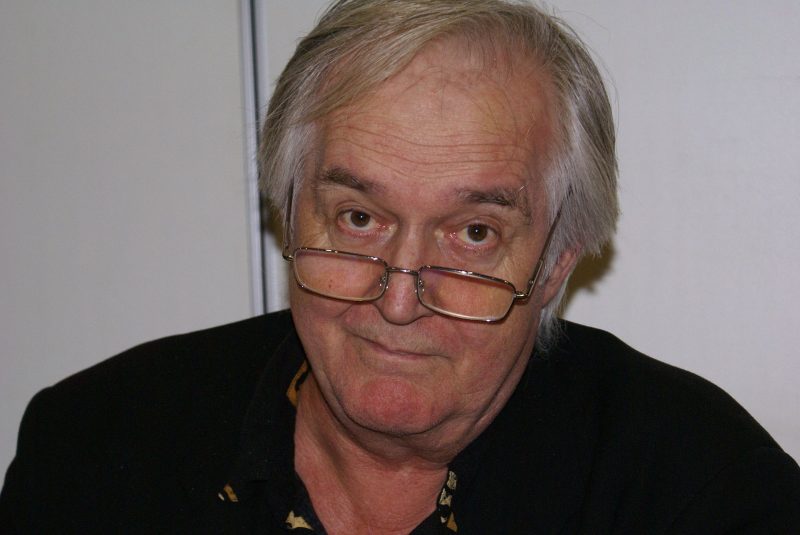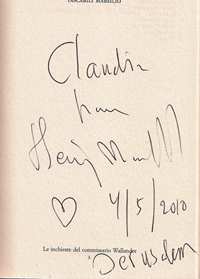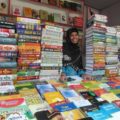
The Palestine Festival of Literature took place all over Palestine from 1st to 6th May. Given the logistic difficulties for many Palestinians to move around freely, the organizers have decided to launch a mobile programme, with writers and intellectuals moving from one location to the other, instead of having people joining a single place, a privilege presently denied to many Palestinians.
 You can imagine my joy and excitement when the organizers told me that Henning Mankell, who was to participate in the festival, could meet me for an interview. I am huge fan of Henning Mankell’s Kurt Wallander series, but I am also aware of his work in Africa and being able to meet him and talk about his relationship and feelings for this continent I love so much, has been for me an enormous privilege.
You can imagine my joy and excitement when the organizers told me that Henning Mankell, who was to participate in the festival, could meet me for an interview. I am huge fan of Henning Mankell’s Kurt Wallander series, but I am also aware of his work in Africa and being able to meet him and talk about his relationship and feelings for this continent I love so much, has been for me an enormous privilege.
Henning Mankell had arrived the day before the interview, and the first thing he told me was how he regretted to have only a few days to spend in Palestine. Still, he considered it important to be present even for a short time. I think it is the quality of his “being there” – the same I feel in his living part of the year in Mozambique, where he promotes culture and lots of other interesting projects – that makes Henning Mankell the wonderful writer and the amazing human being he is.
Claudiaexpat
Jerusalem
May 2010
How does your story with Africa begin?
My history with Africa goes back to when I was a very young writer. At about twenty I started feeling the strong need to see the world outside the European egocentricity in order to better understand it. This is what took me to Africa and what keeps bringing me back. Africa has made me understand the times and the world in which I happen to live. The whole experience has probably also made me a better European, because it allows me to see the whole world at a distance in a better way than I used to, when I was looking at it from the same European standpoint.
I started with Guinea Bissau because at that time a ticket for Bissau was the cheapest I could get. Guinea Bissau was still a Portuguese colony then, so I actually went to Portugal – this is what they said, “Welcome to Portugal”. Luckily times have changed for the better.
They have changed indeed, but Africa keeps suffering. Why is it so?
It depends on the combination of several factors. Africa has suffered enormously under colonization, which took away 400 years from her. What would Europe be today if we had been stolen 400 years of European history? We did not only steal minerals from Africa: we stole time; we stole the patient development of human being. What Africa needs now is time. We have to give her our patience, and time, and this is what we don’t have. What makes me angry is the way we act when we decide to give democracy to a country like Mozambique. We give them money, expect them to have elections and then we get out of it, forgetting that it took us more than one hundred years to sort out democracy. We are failing in our own memory when we want Africa to develop in a short period of time.
Another factor is certainly the image the mass media convey of Africa. Open a newspaper anywhere in the Western world and you’ll see that we all know how Africans die, but we know very little, if nothing, of how they live. I consider this a sort of betrayal towards Africa. This is certainly why Africa does not play an important role in the global world business. We don’t really care about Africa. Sooner or later we’ll have to, because she is still a part of the world and maybe things are slowly changing. If I could come back in 50 years, I am quite sure that a country like Mozambique would be a quite prosperous one. You have everything in Africa, but what they need now is time, and patience.
When people ask me what has to be done in Africa, I answer that out of all the many important things, the one that is really a priority is changing the situation of women. Women of Africa have an enormous responsibility in the production of food and keeping the family together, but they have no influence in politics at all. If the situation for women in Africa does not change, we won’t go very far. This is really one of the first things that should be done.
While we give Africa time and patience, how do we cope with the tremendous injustices inflicted on her, with the fact that so many children are dying for reasons that would be unconceivable as cause of death in the West ?
 I think that listening is very important. We have to listen to what Africa needs, and to assist her – assistance as a sort of repayment. There are many things to be done at the same time. I already talked about empowering women, but as a writer I also feel that more importance should be given to literacy. There are still millions and millions of children that have no access to reading and writing, which is basic to all human beings. It is unbelievable that in 2010 the problem of illiteracy has not been solved. We also have to realize that illiteracy is a sort of pestilence in itself because young people don’t have a chance to find information for instance about HIV if they don’t know how to read.
I think that listening is very important. We have to listen to what Africa needs, and to assist her – assistance as a sort of repayment. There are many things to be done at the same time. I already talked about empowering women, but as a writer I also feel that more importance should be given to literacy. There are still millions and millions of children that have no access to reading and writing, which is basic to all human beings. It is unbelievable that in 2010 the problem of illiteracy has not been solved. We also have to realize that illiteracy is a sort of pestilence in itself because young people don’t have a chance to find information for instance about HIV if they don’t know how to read.
I always believed in the saying that a drop is making a hole in the stone. You can’t save the world, but you can make a difference. You can try to stand on the good side. And when many drops fall together in the same spot, they make a deeper hole. This doesn’t mean that sometimes even I can feel helpless, and I can’t see the changes that I would like to see brought about, but I know that I have to forget about that, I have to believe that changes sooner or later will arrive. If you don’t believe that what else can you do?
You once said that we have to look for differences in cultures to find similarities. How would you apply this to your experience in Africa ?
I can tell you a small but very meaningful anecdote about this. Once I was driving my car in Mozambique, and one of my black actors was sitting beside me. He has a really black complexion. We almost had a very bad accident, and I saw him getting pale. We can hardly believe a black man can be pale, but he can. I will never forget that. We all laugh for the same reasons, we cry for the same reasons, we are all human beings and belong to the same family in a way.
I also think that Europe has lost the capacity of listening. We go to Africa with a suitcase full of talking, instead of coming down and listening. If you want to see someone, you have to learn to listen to him or her. I think this is a huge problem. We have lost our capacity of listening. I have been working so well in Africa because I can listen. In the 25 years I have been working in Africa, I don’t think I ever got there with an answer – I always arrived with a question. This is very important. And of course you have to listen to others to understand more about yourself. You will then realise that while you are searching for differences you find similarities. I think this is the beauty of all human beings, that we are all the same family.
Can you tell us about your Memory Project?
This is a project that also has to do with literacy. Ten years ago I read about a project set up in Uganda. Someone was helping parents with AIDS to collect some sort of history for their children. In Africa there are too many young parents dying form AIDS, and their young children are left without memories at all. We all know that if we have no memories of our parents, it is impossible for us to understand who we are. I got so intrigued by this project that I decided to go to Uganda to find out more about it.
One day I was visiting a village near Kampala where lots of people were dying of AIDS, and while I was talking to some people, I saw a little girl hanging around – I had the feeling she wanted to talk to me. She kept a very small book pressed to her chest, and when we finally got together, I realized that she wanted to show it to me. I took it and I opened it, and in between the pages I saw a pressed blue butterfly. And the girl said: “I had a mother who loved blue butterflies”. This is probably one of the most important books I have read in my life. I understood that you can tell who you are in many different ways. There I saw an astonishing example of how desperately this dying parent was trying to convey something of her to her child.
The Memory Project is about collecting documents from dying parents that want to leave their stories to their children. I sometimes believe that in 500 hundred years from now the documents collected from these dying people will be looked as very important ones.
To shift to Kurt Wallander: why don’t you like him?
It’s not that I don’t like him, but I think we are quite different. I think he treats women strangely, in a way I don’t appreciate. This does not mean I dislike him, I’d rather say I don’t have a strong affinity with him. But it is certainly easier to write about someone you don’t like, you can keep a better distance from that person. What’s important is obviously that there are millions and millions of people that like him.
To say that Henning Mankell is prolific is to say the least – what do you like to do the most?
Writing, obviously, that’s my life. There is a mythological South American bird that can’t stop flying because if it gets to the ground he dies. I feel very close to that bird. Creativity is the lifeline in my life. Creativity is all for me. I like very much to divide my writing into novels, articles, and theatre plays. I just finished a theatre play about Olof Palme, I am now writing a new novel. I am also writing a TV series on Ingmar Bergman. As a farmer, I try to use the earth to cultivate different crops, so the earth will be kept alive.




